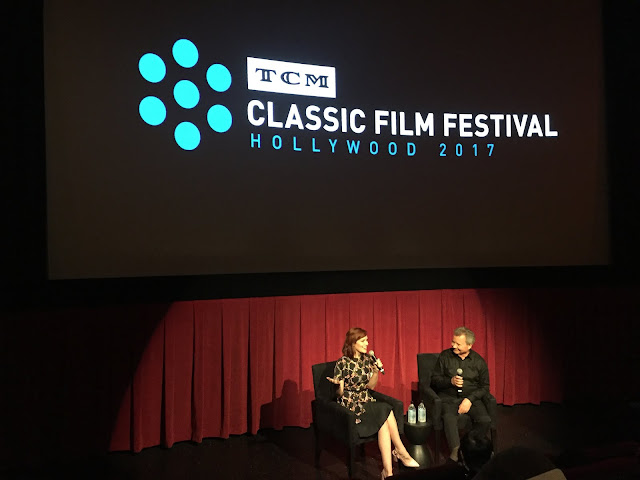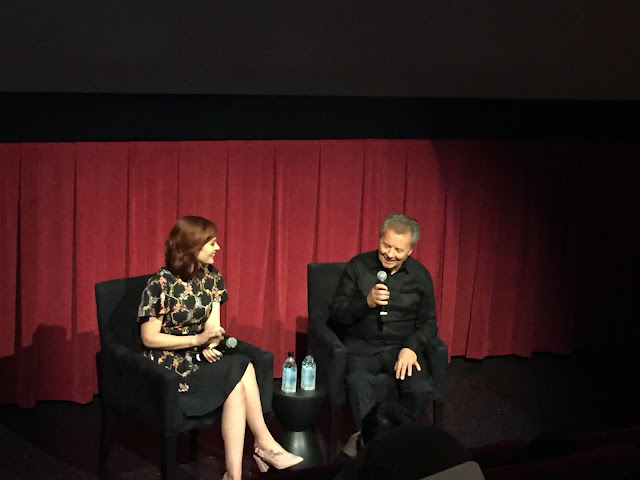 |
| Alicia Malone and Stathis Gialellis at the TCM Classic Film Festival |
"I am a Greek by blood, a Turk by birth, and an American because my uncle made a journey."
Elia Kazan
What's a more American story than one of immigration?
America America (1963), Elia Kazan's three hour epic was the most personal of all of his films. Inspired by his family's emigration from Turkey to America, Kazan adapted his autobiographical novel to screen.
America America tells the story of Stavros, a young Greek man living in Turkey when Greeks and Armenians were suffering under Turkish oppression. He sets out for America with the intention of bringing his family there one by one. But his journey is filled with many obstacles that test his will and determination. Shot on location in Istanbul, Turkey and parts of Greece, it stars a young unknown Greek actor Stathis Giallelis in a part of a lifetime.
When the opportunity arose to watch
America America at the 2017 TCM Classic Film Festival I could not turn it down. Given our current political climate this film is now more relevant than ever. The UCLA TV & Film Archive provided a beautiful print and Filmstruck host Alicia Malone was on hand to interview the movie's star Stathis Giallelis before the screening.
Malone started the conversation by noting that
America America is about an epic journey and that Giallelis had his own epic journey to get the title role of Stavros. The main character is in every scene in the film and carries the movie on his shoulders. It was no small feat and Giallelis needed to convince Kazan he was right for the part.
 |
| Elia Kazan and Stathis Giallelis on the set of America America (1963) |
Giallelis remembered the audition process as being "a long journey." He auditioned for Kazan who responded with a letter telling him that he had to learn English. Giallelis met with producer Charles H. McGuire and while things seemed to be moving forward Kazan wasn't ready to commit. Determined to impress him, Giallelis enlisted his friend Vassillis Vassilikos, author of the novel
Z, to write letters in English to Kazan on his behalf. They sent letters back and forth and Kazan finally replied saying that there was a visa waiting for him at the American Embassy. An invitation? Not quite. Giallelis remembers, "but he didn't send me any money and I had no money so I borrowed some money from my uncle, from some friends and I got the cheapest ticket to come to America. And I didn't tell him I was coming to America."
When Giallelis arrived he surprised Kazan in New York City. Kazan gave him fifty dollars to find a room in the city to stay in. Still not fluent in English, Giallelis told the audience that he tried gesturing to a taxi driver what he wanted and tried to pay him with the fifty dollars but had no luck. Finally Giallelis got settled. He was assigned an English tutor and Kazan and Giallelis meet with each other every day. Just when things were starting to progress Kazan introduces Giallelis to a French actor who was also a candidate for the part of Stavros. This didn't stop Giallelis who kept trying for the role. He remembers, "[Kazan] was very elusive about who was going to get the part. He gave me a red book and it was the script. He says to me read this... One day he came up to me and said the French actor went back to France."
Over the years Kazan changed his story of how he cast Giallelis, who joked that the older Kazan got the more the story changed.
 |
| Alicia Malone in conversation with Stathis Giallelis |
Malone went on to say, "you must have had incredible determination to get that role and that of course mirrors your character. Such grit and hope and optimism. How would you say this film sums up the immigrant spirit?"
Giallelis replied, "you have to give up everything. Mine looked like an easy journey. All of us are from somewhere. Our grandfathers, our fathers they came here."
For Kazan, this message was everything and it's so beautifully and harrowingly expressed in his film. Malone asked Giallelis if he got a sense of how special the film was to Kazan while they were on set. Giallelis replied, "yes many times. Sometimes after a scene he'd be hiding on the set. Sometimes you would see him crying. It was very emotional for him."
Kazan would communicate with his actors what he wanted but wasn't very demonstrative. Giallelis remembered, "he would say "I want you to give me this emotion for the scene" [but] he would never show you how to get it... He always knew about his actors. He knew about our lives and what moves us. And sometimes ... you would let him use his knowledge because it would help you as a performer. That was his secret."
The set of
America America was a small one and Giallelis remembers there being a lot of camaraderie and love among the group. Kazan remained friends with Giallelis up until Kazan died in 2003. Giallelis also became good friends with
America America cinematographer Haskell Wexler. On Wexler Giallelis said, "he was my best friend.. Every two years we'd come and stay with him for a while. Haskell was a very special man. Not only a great talent and fantastic cinematographer but he was also a great human being. His political views were very hopeful for everybody. And sometimes people thought he was too far to the left. He was a man who always fought for justice. For justice for the under dog. He was always fighting." Giallelis shared with us a funny story of how Wexler was shooting some test footage to see how Giallelis' face would photograph and asked him to shave his mustache. He directed Giallelis to the wrong bathroom. When he opened the door a gang of Italian women started screaming and chased him out of there.
 |
| Stathis Giallelis in America America (1963) |
After
America America, Stathis Giallelis went on to make a smattering of films. He was in
The Eavesdropper (1966) by legendary Argentine director Leopoldo Torre Nilsson and producer Paul Heller. He then made a couple of political films and the war movie
Cast a Giant Shadow (1966) with Kirk Douglas, Yul Brynner and John Wayne. He worked with Jules Dassin on
The Rehearsal (1974) and remembered it being "another great experience because [Dassin] was very much like Kazan." Giallelis didn't say why he gave up acting but I imagine it was difficult to eclipse the work he did on
America America.
Giallelis left us with one last tidbit before the screening began. Malone asked him what the audience should be looking out for when they watch the film. He pointed to his favorite scene when his character Stavros is on a boat on his way to America. He contemplates the tough journey that brought him there and says when he arrives at his destination that he will be washed clean again.
Out of all of the films I saw at the 2017 TCM Classic Film Festival, this was the one I was the most excited about. I wish it had been a packed house but the film was in a tricky time slot and a three hour drama will have steep competition from shorter, lighter fare. However I hope everyone who did attend was as moved by the film as I was. I had seen the film before and
reviewed it some years ago but hadn't revisited since then. When I saw it announced on the TCMFF schedule and that Stathis Giallelis would be in attendance I made it a priority to go. The film blew me away for new and different reasons than it had the first time. If you didn't get a chance to attend this screening or if you've never seen the film before, make it a point to watch
America America. You won't regret it.
I had the honor of meeting and briefly interviewing Stathis Giallelis. Stay tuned for my TCMFF Red Carpet coverage coming soon.











































